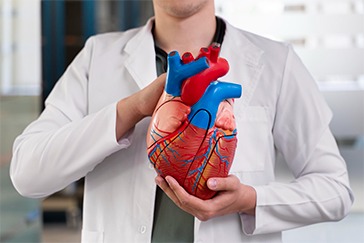 Book Appt.
Book Appt.
 Call Now
Call Now


Aortic Aneurysms: Causes, Symptoms, Diagnosis, and Treatment
Aortic aneurysms are a potentially life-threatening medical condition that involves the abnormal dilation of the aorta, the largest artery in the body. SHALBY Sanar International Hospital is committed to providing comprehensive information about aortic aneurysms to raise awareness and ensure patients receive the best care possible. This article will explore the causes, symptoms, diagnosis, and treatment options for aortic aneurysms.
Causes of Aortic Aneurysms
Aortic aneurysms can develop due to various factors, including:
Symptoms of Aortic Aneurysms
Aortic aneurysms often develop slowly and may not cause symptoms until they become large or rupture. Common symptoms may include:
Diagnosis of Aortic Aneurysms
SHALBY Sanar International Hospital offers a range of diagnostic tests to detect and assess aortic aneurysms:
Treatment Options for Aortic Aneurysms
Conclusion
Aortic aneurysms are a serious medical condition that requires early detection and appropriate treatment. At SHALBY Sanar International Hospital, our dedicated healthcare professionals are committed to providing comprehensive care for patients with aortic aneurysms, from diagnosis through to treatment and rehabilitation. By raising awareness and offering advanced treatments, we aim to improve the quality of life for individuals affected by aortic aneurysms and reduce its impact on our community. Early detection, personalized treatment plans, and a commitment to patient well-being are vital for effectively managing aortic aneurysms and promoting vascular health.
SHALBY Sanar International Hospitals provides extensive medical procedures backed up with our state-of-the-art technology and a team of highly qualified & experienced clinical experts.

Life-Changing TAVR Success Story | Dr. D.K. Jhamb | SHALBY Sanar International Hospitals

Timely Angiography Procedure Saves life of Iraqi Patient.

Rajiv Makhni, Managing Editor of NDTV, Shares His Experience at SHALBY Sanar International Hospitals

A successful treatment procedure helped Ms. Suri get over breathlessness
Our doctors pen down their research findings and experiences from time to time. Their words provide deep insight into the latest techniques, technologies and other advancements in healthcare. It provides expert answers to all kinds of health questions for real-life issues.
VIEW ALL




Since the day of its foundation, SHALBY Sanar International Hospitals is committed to provide comprehensive healthcare services. It regularly organizes awareness programs in its premises and encourages outdoor healthcare activities and camps with an intent to put focus on preventive healthcare.
VIEW ALL